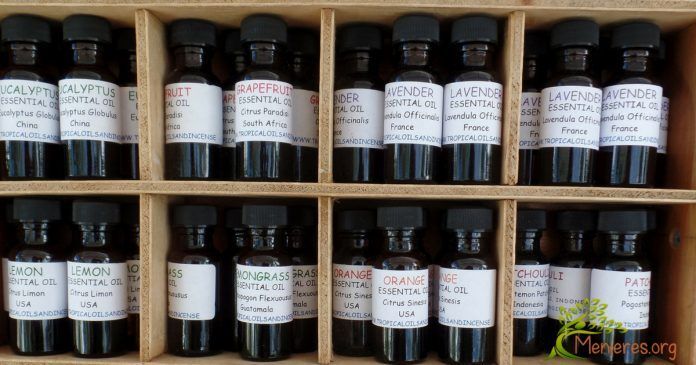
A French doctor by the name of Prosper Meniere knew vertigo was an inner ear problem in the late 1800s. He discovered a variety of other symptoms that seemed tied to vertigo including tinnitus, hearing loss, headaches, nausea, and stuffiness in one ear. This combination of symptoms (in whole or part) became known as Meniere’s Disease.
Meniere’s Disease seems focused on issues with the fluid levels in the inner ear. It’s a rare condition occurring in about .2 percent of the population. Of that, more women than men experience Meniere’s, particularly those between 40-60 years of age. Of the physical issues that Meniere’s creates, vertigo is top of the list in terms of what patients worry about. The falling or loss of consciousness is frightening, and a safety issue.
Meniere’s Cause & Cure
There is no one test for a Meniere’s Disease diagnosis. So, doctors look at the whole of your symptoms and use tests that will rule out other underlying health problems that could be severe. We know that Meniere’s causes excess inner ear fluid. There are also theories that say it may be an autoimmune disordered sometime triggered by head or neck injuries, infections, or allergies.
There is also no definitive cure for Meniere’s Disease. Treatments aim to reduce the severity or frequency of vertigo episodes. Each person responds to treatment differently, which means it may take time to find what works for you. Among the options, there are natural remedies like using essential oil as a Meniere’s therapy targeting vertigo.
What is Essential Oil?
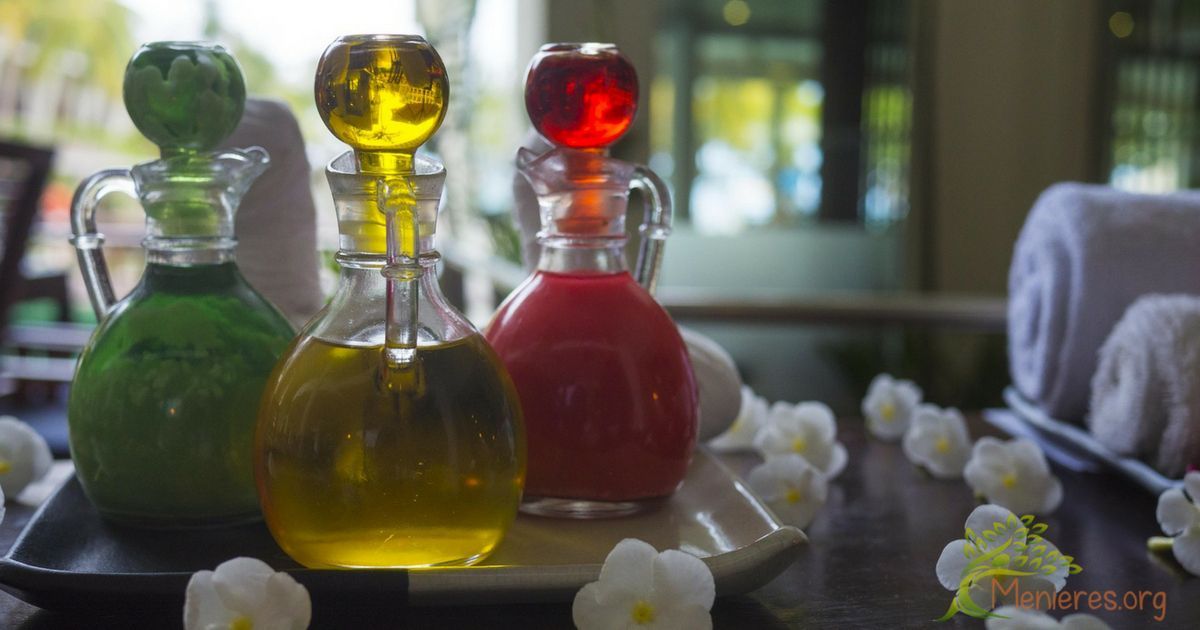
Essential oils differ vastly from scented oils that often contain chemical components. An essential oil comes directly from plant parts including flowers, seeds, leaves, and roots. The oil originates from a distillation process, either by steam or water. The result is a concentrated oil that has not only the aroma of the plant from which it came but also the beneficial properties including healthful ones.
If you are considering using essential oils for Meniere’s, please be careful of your sources to make sure what you are getting is not diluted or poor quality. There are things you can do to sort things out at the store:
Tips for Spotting Fake or Synthetic Essential Oils
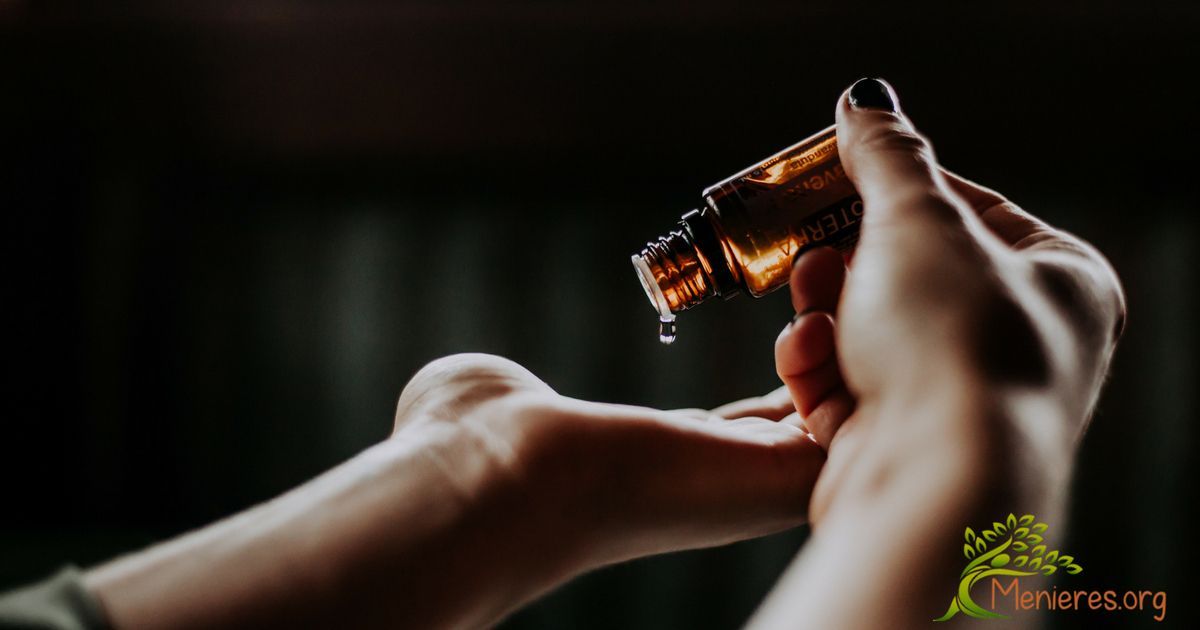
Aroma: Does every bottle you buy from the same supplier smell exactly alike? That’s very unusual in essential oils because the plants receive different amounts of sun and rain every year. A consistent aroma can indicate a synthetic oil.
Containers & Placement: Look for products in dark glass containers (blue or amber), typically in 4-ounce sizes or less. If the stock is in a hot area, chances are the quality of the oil has already suffered.
Identification: The name of the plant should be on the label using the plant name with the designation “100% pure essential” and the Latin name as well. Many herbs have more than one strain, not all of which make the best products.
Labeling: Look for a USDA seal or organic notation. Alternatively, the term wild-crafted means there is no chemical used in growing the plant.
Pricing: Most of the time true essential oil isn’t cheap. It takes a lot of roses (upward of 4,000 pounds) for example, to make essential rose oil (it is one of the most expensive distillations on the market). Unless you trust your supplier, be wary of very inexpensive oils.
Finally, there is the paper test that’s easy to use. Put a drop of the oil on a white piece of paper (any will do). Let it dry. There should be no oil ring on the paper afterward. If there is, the product is not a pure essential. Dark oils may leave a tint behind, but the feel should not be greasy.
Research Regarding Essential Oils and Meniere’s Disease
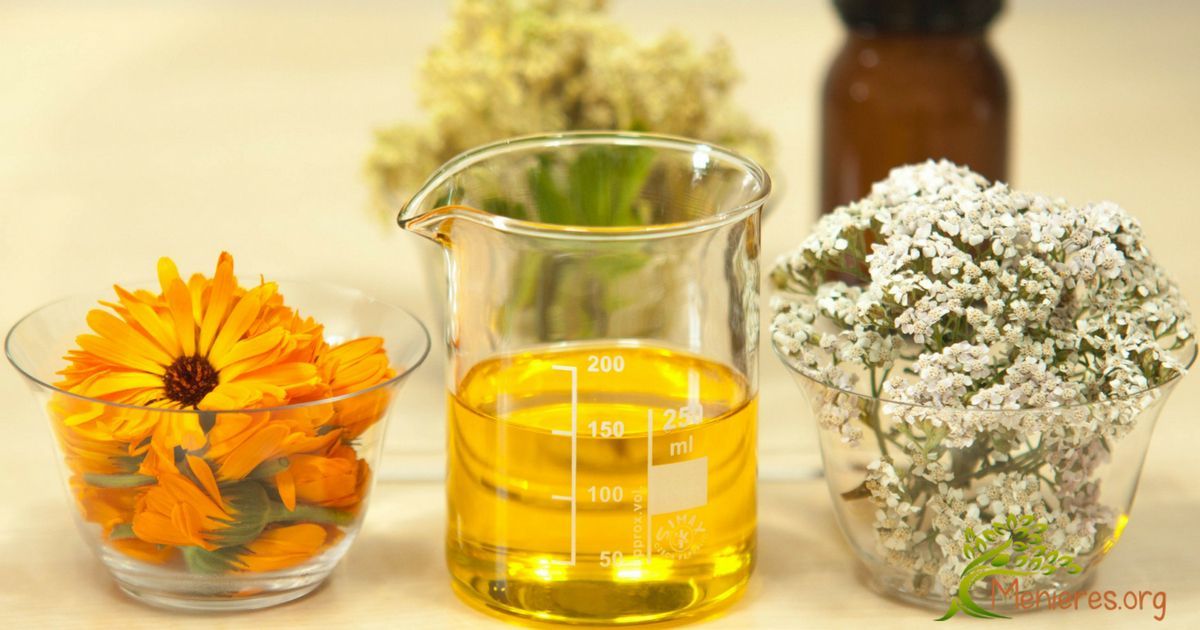
There is no question essential oils have a long history of use in the healer’s kit. Lemon Balm oil treated vertigo, headache, and nausea in ancient Greece and Rome. Peppermint oil was common in Egypt, China, and Japan for both culinary and medicinal applications.
Modern studies are still catching up with the ancients, but several have tried to illustrate how oils help various issues. Returning to Lemon Balm, a 2004 study suggested essential oils can prove successful if one uses them for stress reduction. Other studies indicate that various aromas can ease anxiety and improve a person’s overall mood. There is also science backing the fact that essential oils have antimicrobial properties.
What to Know before Using Essential Oils for Meniere’s Dizziness
There are a few bits of info you need before you use any essential oil to treat your Meniere’s Disease symptoms. Some people have a sensitivity to specific oils. Externally, you should always try just a small bit before using much more.
The instructions for using your oil may also call for dilution to avoid irritation. Follow them. Usually, they will give you proportions of X drops of oil to X amount of carrier oil. Common carrier oils include avocado, apricot kernel, almond, and coconut.
Essential Oils for Meniere’s Vertigo
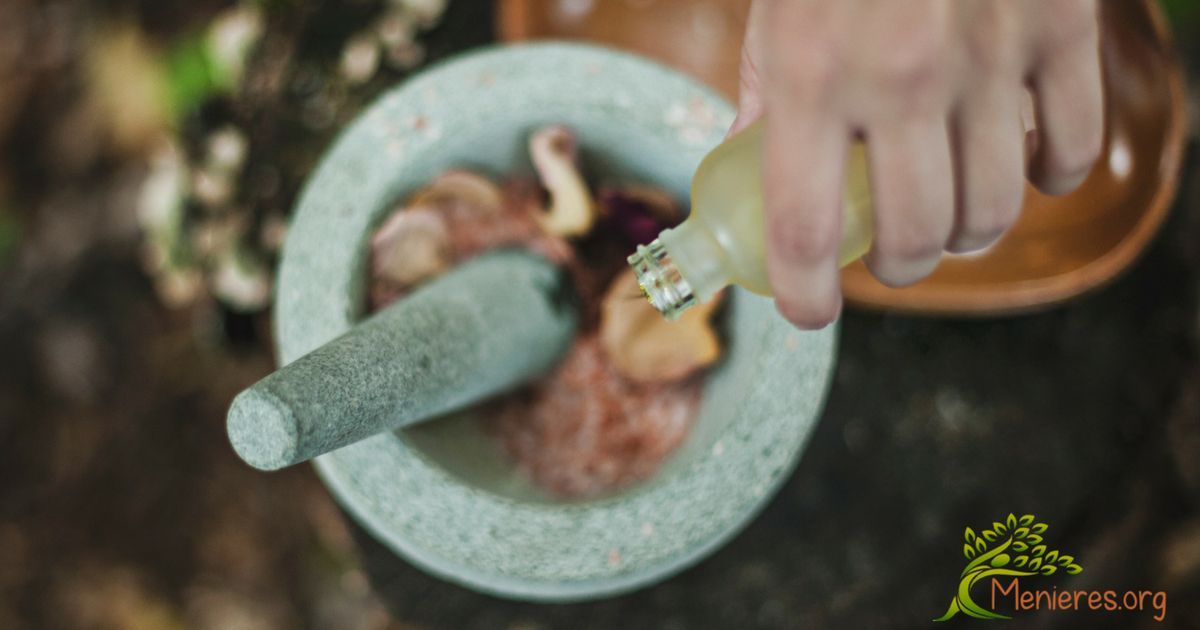
While essential oils are not cures for vertigo, they can ease the symptoms. Essential oils also are not a suitable substitute for proper medical care and tracking. When you feel like the entire world is spinning around you and the sensation which seems like it goes on forever, you will want easy treatments available. Essential oils can improve your mood, decrease stress, and manage vertigo-associated nausea with little fuss.
The Oils
There is a variety of essential oils recommended for the vertigo symptoms brought on by Meniere’s Disease. You should try these individually and make notes of what seems to help the most.
Basil Oil: Basil has both antioxidant and anti-inflammatory properties that clam busy brain and ease depression or mental weariness. It also improves respiratory function, bringing more oxygen into your brain (which lessens vertigo). Use it in a diffuser.
Bergamot Oil: A lovely citrus-scented essential oil, this is excellent for several vertigo issues including nausea depression and anxiety. Overall the aroma stabilizes your nervous system.
Cardamom Oil: Cardamom targets the nausea and vomiting spasms from vertigo. It also helps with migraines which are often part of the Meniere’s profile. Add two drops of this oil to two teaspoons of carrier oil and massage it into your temples.
Clary Sage Oil: Is important for Meniere’s management because it settles an over-active nervous system. Use this as an oil for a chest massage or in a diffuser.
Cypress Oil: This oil stimulates brain function and healthy blood flow. You become more alert and aware, which sometimes fights dizziness. Both steam treatments and massage are good ways to use Cypress.
Frankincense Oil: Has a long history of use in combating anxiety and balancing the vestibular system (particularly overactive nerves). This is because it reduces inflammation. Rub a few drops into your temples and neck, or add it to a diffuser.
Ginger Oil: Is great for nausea and for those who experience diarrhea as a side-effect of Meniere’s. For a tea, you only need one drop to a full, hot cup of water. As an inhalation, it improves your energy and decreases anxiety. If you find you have a stiff neck from holding your head differently due to Meniere’s hearing loss, you can use Ginger as a massage oil. Use about 10 drops of the oil in one ounce of carrier oil.
Lavender Oil: Caution: Many people have an allergic reaction to the smell of lavender so check this first. For vertigo, lavender soothes nerves that often get jittery during an episode. You can put a drop or two on your pillow for improved sleep or use a room diffuser for all-day stress reduction.
Lemon Balm Oil: This reduces anxiety, allays vomiting, and improves overall digestion. This aromatic may also improve the quality of your sleep.
Peppermint Oil: This oil improves your focus and also helps with nausea. Inhalations of peppermint improve airways while a massage of the head, neck or temple relaxes tensions.
Rose Oil: Rose is one of the most versatile flowers in the world. With Meniere’s, you can use the aromatic in a bath or diffuser for ongoing relaxation (5-10 drops daily) or deterring effects of vertigo.
Rosemary Oil: Rosemary targets cognitive functions. It may sooth Meniere’s triggered headaches and relieve dizziness. Use 3-4 drops in hot water as an inhalation.
Tangerine Oil: This helps to reduce various Meniere’s symptoms including vertigo, dizzy spells, and headaches. It has the additional benefit of helping keep oxygen in your blood. If you don’t have essential oil handy save the rind from a tangerine, wash it well and add it to your next cup of tea for both aroma and flavor.
Precautions when Using Essential Oils for Meniere’s Symptoms
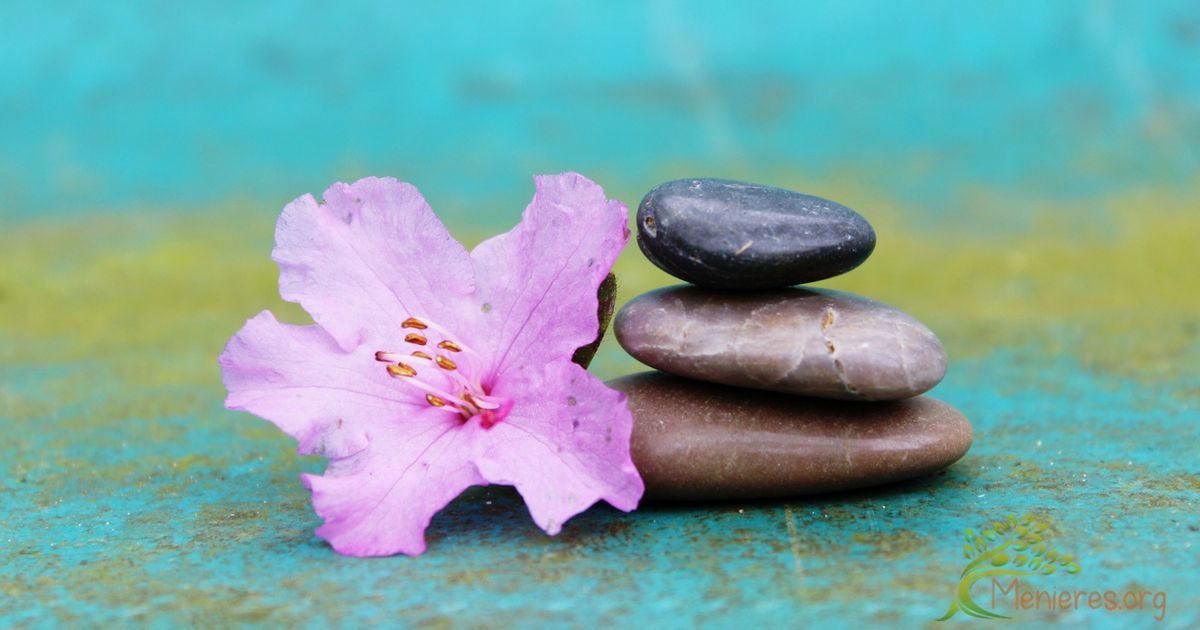
If you are using essential oil as a massage remember that certain oils like Bergamot and Tangerine can make your skin photosensitive. If you will be in a sunny location for more than 30 minutes, it’s best to avoid these oils beforehand or apply a suitable sunscreen.
When using essential oils internally do so with tremendous caution. Consider that your oils are far more potent than an average cup a tea. Because of this, it’s strongly suggested that you seek a trained professional. Studies indicate that some essentials can act like antibiotics, but a lot more research needs to happen in this field.
Women who are pregnant or nursing should take greater precautions because some Essential oil may cross into the baby’s placenta causing hormonal imbalances. Vertigo oils unsafe during pregnancy include ginger, peppermint, and rosemary.
Last, if your bottle of oil cracks, never replace it with a plastic container. Essential oils degrade plastic. Oils don’t maintain their highest quality when stored this way. If an oil ever turns cloudy, it is no longer suited for treating your Meniere’s vertigo.



